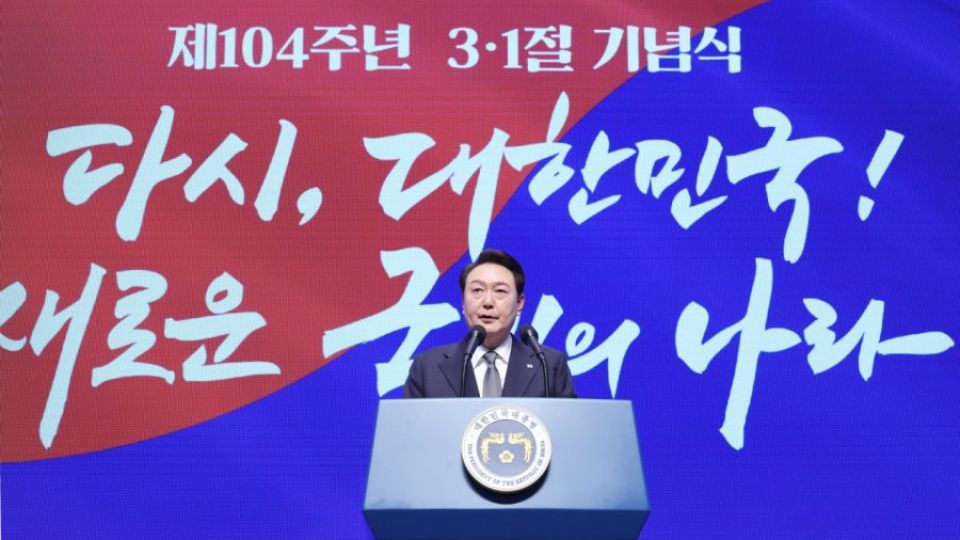March 2, 2023
SEOUL – South Korea needs Japan on its side as a partner to elevate its own global status, President Yoon Suk Yeol said Wednesday, as he looked to move beyond the constraints of their historical disputes dating to Tokyo’s 1910-45 rule of the Korean Peninsula.
The speech, made to mark Independence Movement Day, laid out a clear blueprint of how Seoul will handle relations with Tokyo in the context of a three-way coalition that includes the US — the chief ally of both Korea and Japan. The trilateral ties are more crucial than ever to counter global challenges, including growing nuclear threats from North Korea, according to Yoon.
“Japan has transformed from a militaristic aggressor of the past into a partner that shares the same universal values with us,” Yoon said, highlighting a coalition of like-minded countries with the same respect for such values as freedom. Building on security and economic ties with those partners are an urgent task, Yoon added.
The speech, experts said, embodies Yoon’s determination to get past a longtime historical feud over offering restitution to Koreans forced to work for Japanese companies during World War II — one of the two major disputes along with the sex slave issue awaiting resolution after months of negotiations.
Tokyo is reluctant to accept Seoul’s offers on the table, since they involve a direct apology and compensation. Korea’s Supreme Court in 2018 held Japanese firms liable for damages, a ruling the Japanese have since refused to uphold.
“A fresh, bigger perspective is where Korea is going with to handle Seoul-Tokyo ties, including finding ways to end the labor dispute. So it’s now more about what closure means for Korea as it searches for its place in a new world,” said Choi Eun-mi, a research fellow at the Asan Institute for Policy Studies, noting how exactly the Yoon government would angle for a resolution remains to be seen. The Korean leader did not mention the dispute in the speech.
Lee Won-deog, a professor of Japanese studies at Kookmin University, said the omission indicated that the two Asian neighbors are close to shaking hands on a deal, an intended oversight meant to keep the behind-the-door negotiations intact until Yoon and his Japanese counterparts come to an agreement.
“What I see is that Yoon made a move. He gave to the public broad strokes about foreign policy goals involving Japan while leaving policy room for closing the deal that I think is being discussed even as we speak,” Lee said.
Yoon is meeting with his US counterpart in April and his Japanese counterpart in May, a succession of summits that makes a March deal uniquely appealing to strategically expand on Korea’s plans to seek a bigger global imprint alongside Washington and perhaps Tokyo, according to Lee.
Seoul, Lee added, could be preparing to bring closure to the dispute on its own, meaning the Yoon government would act on a previously announced plan to pay Korean victims with funds entirely from the contributions of Korean companies. The representative for the victims have rejected the proposal, accusing Seoul of being overly soft on Tokyo.
Foreign Minister Park Jin talked to the victims’ families Tuesday, but the specifics of the discussion were not revealed, with Park declining to even speak of a rough timeline on a settlement. It was the first time for Park to meet with the families affected by the 2018 Supreme Court ruling. Park has called for a “political decision,” essentially asking the Japanese leader to meet Korea halfway.
Meanwhile, Lee Jae-myung, the leader of the main opposition Democratic Party of Korea, dismissed Yoon’s speech, accusing him of submitting to Japan because the Korean leader is neither forcing Japan to face up to its history nor compensating the victims the right way in accordance with the court ruling. Building trust that bolsters ties, therefore, is impossible, Lee noted.
At a press briefing later in the day, Japan’s Chief Cabinet Secretary Hirokazu Matsuno said Korea was an “important neighbor country” in the fight against global challenges. Tokyo plans to work closely with Seoul to advance relations, he added.


